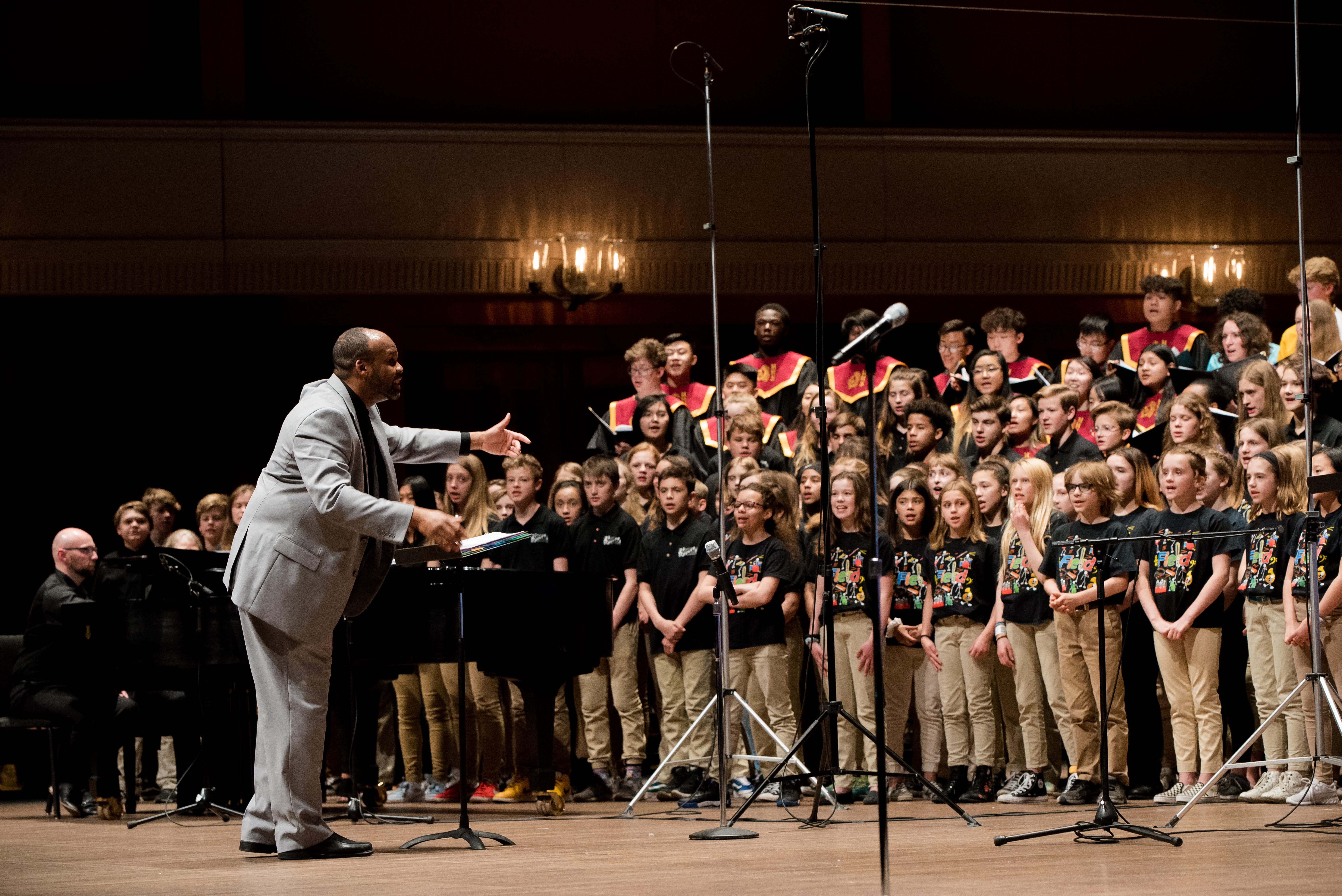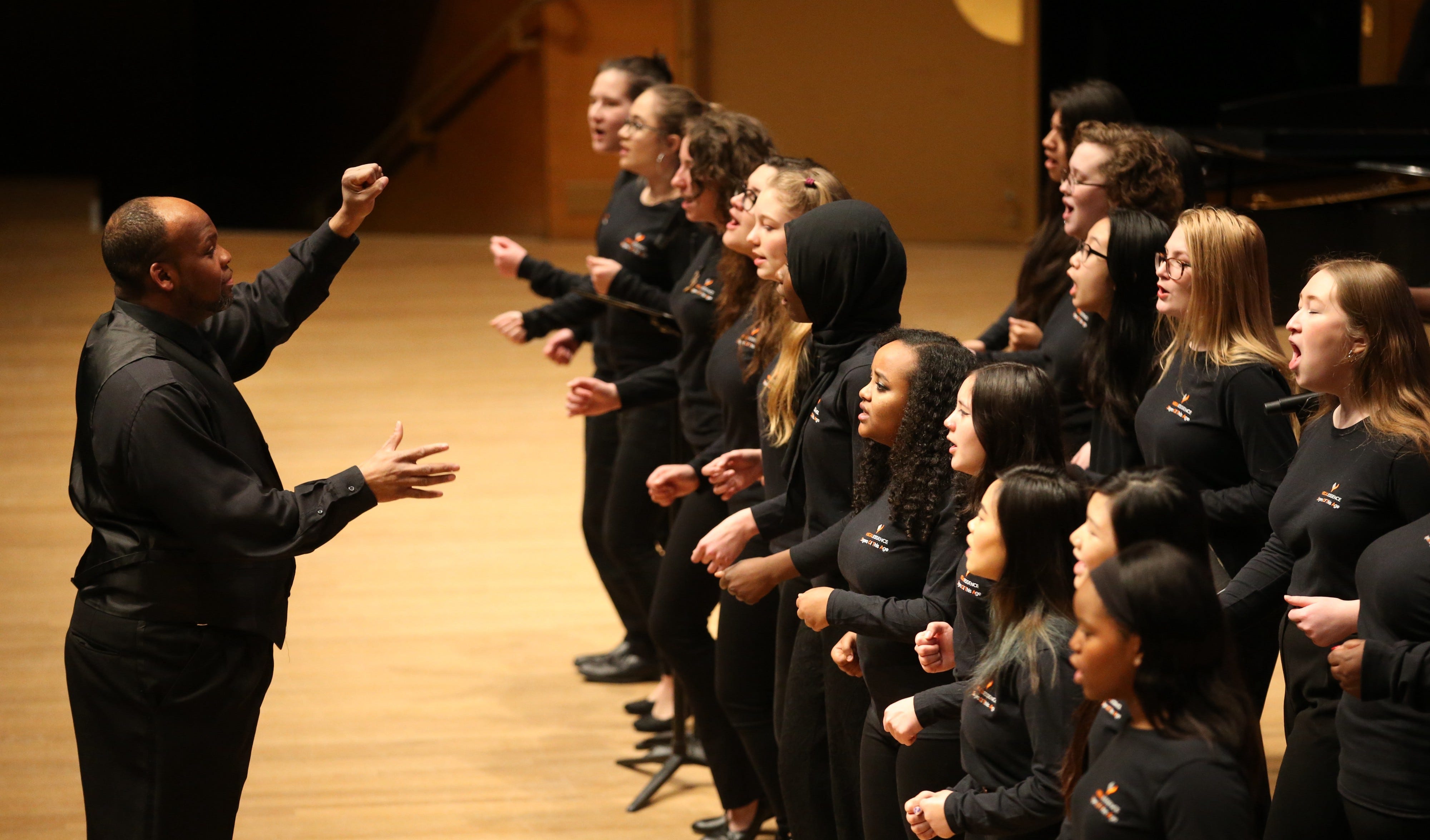Choral, Community and Creativity in Times of Crisis: Interview with Philip Shoultz of VocalEssence
#MusicWithAPurpose is a series dedicated to continuing the conversation surrounding music education and expression, both pre and post COVID. Today’s interview features Philip Shoultz, Associate Conductor and Director of Learning and Engagement for VocalEssence — a 52 year old performing arts organization based in the Twin Cities. Shoultz discusses the power of community, music and creativity in times of crisis.

Pre-COVID, or the “BC Times”, as Philip Shoultz likes to call them, VocalEssence, like many performing arts organizations, was strongly rooted in live performance. Founded in 1969 by Philip Brunelle, VocalEssence has thrived on major music stages across the Twin Cities and in the international choral music scene, boasting an impressive track record of recordings, commissions, guest composer visits and accolades. Additionally, their community-based initiatives — aimed towards school-aged children, families with children, and even older adults, reach 20,000+ people each year.
Shoultz, VocalEssence’s Associate Conductor and Director of Learning and Engagement, grew up in Georgia, but moved to the Twin Cities to pursue his doctorate at the University of Minnesota. He was already familiar with VocalEssence’s notable reputation when they reached out to him for what was supposed to be a temporary position. Now, celebrating five years with VocalEssence as a full-time staff member, Shoultz leads the learning and engagement programs and conducts the professional singers, the volunteer chorus of 120 adults and the 50-student four year-old youth choir, Singers of This Age — SOTA, for short. Comprised of students from 20 different Twin Cities high schools, Singers of This Age provides students with everything from transportation to meals to uniforms, and connects them with amazing artists so that they can see that the choral arts are “a little bit more than people think of”, Shoultz explains. “Minnesota has this great choral tradition and we celebrate that. And we like to expand and build on that by showing that there’s so much more music and so many other genres and styles that can be incorporated into groups singing.”
Building A Strong Community
While there is a core of students who naturally gravitate towards choral music based on their family’s background or music in their households, VocalEssence aims to build on that by expanding the range of people who participate.
It’s a very socioeconomically, culturally, faith-perspective, political perspective diverse group of individuals, so the way we do that is by looking at the barriers of participation. For some of them it is things like cost and transportation — the usual logistical things. But when you really peel back the layers, it gets down to representation; do you see yourself in the music or the art form in some way? Do you see yourself being accepted as you are? That’s one thing we really work on — creating a space for belonging for each student. This is something that they begin to name after our first year, which made us feel good that we’re doing the right thing; saying, “ I can be who I am when I’m at SOTA”. Can the students see themselves and be accepted just as they are and all the ways that they identify? With that representation is also having artists that look like them, as well as music that they might recognize or even more so, relate to. With so many cultures reflected in the group, we make a point every year to in some way or another do something that reflects or represents everyone’s background. Because I see the choir as a space for conversation — a space for collaboration and then transformative conversation to create a really strong community to support them through the inevitable challenges that life will throw at them.
SOTA purposely maintains a cap of around 50 students, creating a tight-knit community that goes beyond singing. “It truly does become like an extended family; we’re checking in on grades — I have a stack of recommendation letters I need to write for the seniors this year. We’re concerned about every aspect of their social, emotional, physical well-being and stay in touch with their parents.”

Shoultz admits, that during the program’s pilot year, there were some “logistical nightmares” and uncertainty regarding how it would work . However, watching the group get on stage at Orchestra Hall for the first time after months of preparation, is something he’ll never forget. “It was a Thursday night rehearsal; we walked into the room and their eyes just lit up — because they’re on the stage, not in the audience. Many of them actually said, “I never thought I’d see myself on this side of the stage”.
Shoultz and his colleagues proudly turned to each other; “yeah, it really is worth all the hassle”.
This, of course, was before COVID.
Adapting to COVID
SOTA had just finished a major set of performances for the American Choral Directors Association in Milwaukee when the COIVD-19 pandemic hit. Without missing a beat, they continued to meet every Monday online via Zoom throughout the summer until it was OK to meet in person again — physically distant, of course, with masks. “That’s what a good community will do”, explains Shoultz. “And that’s how I see the choir; if you create a space for belonging and acceptance, the students really buy in and see it as a home and then the singing just becomes second nature from there.” Through June, attendance on every Zoom rehearsal reached about 85–95%.
“I think part of the reason why we kept that retention was we had a bunch of online activities going; we were still creating.” One of these projects, VE SOTA Shares Hope, encouraged singers to choose a song that inspired them, record it on their phone and pair it with a message of hope. Using Flip Grid, a program that allows communities to videos, the group watched each other’s videos and and boosted each other up. They soon shared these videos to social media and started gaining traction. “That gave them hope; they were still using their artistry. It was individual, but we were still creating music and still living out our mission as a group.” So, Shoultz gave them another challenge. “I think keeping them creating kept them coming back, because something was being fed that they were missing in other places of their life.”
Still, things were different and Shoultz noticed it early on. “April and May were just filled with that sense of just depression — from not being able to be around your friends and maybe stress at home.” He found himself having extra phone calls, just checking in, with his students. “They would talk about it some, but you could still see people were holding on, because they didn’t know how to articulate really what was going on in their mind.”
Currently, the group — now at 25 students with last year’s seniors graduating and caution over recruiting during a pandemic, meets twice a week — once in person and once online.
Naively, we all thought there was just going to be a day when the Governor’s orders would be over and we’d be back to some sense of normalcy — not realizing in reality we’ve got a new normal to create. Singing with masks is really weird. Keeping high school kids 6–10 feet apart is like an act of the Almighty Creator. So I carry a five foot pool noodle with me, literally and I’ll whack them — in love. They’re so used to being able to — hug. But we can’t get together if we’re not going to adhere to the things that are going to keep us safe, to the best of our knowledge. And they want to do it. But it’s that struggle. You want to pull your mask down so I can see the smile on your face. And we have to sit in these big circles — everyone’s ten feet apart; it’s like 40 feet in the middle of the circle. So it’s like you’re in another universe.
Music and Social Justice
In June, there was another major shift in the Twin Cities.
While the death of George Floyd and turbulent aftermath sparked unrest nationwide, the anxiety, fear and trauma was intensified for the many VocalEssence students living in the peak of zone of where these activities were happening.
Shoultz and his singers jumped into action; “we’ve used our bodies as ways of resistance and healing and action.” Many of the singers were at the protests. As a group, they did cleanup work in the community and volunteered at a food pantry. “We’re trying to help them unpack the trauma that we’ve all experienced. I think we’re all, even adults, still trying to articulate what we’re going through because it’s not over yet.”
Making the Digital Shift
“We have to stay connected to keep creating”, Shoultz believes. Taking advice from his colleagues at VocalEssence, he started an innovative Facebook and Youtube livestream, Take Five With GPS, now on it’s 175th day in a row. “By doing this, we’re saying we have to sing differently now. We’re still singing together, but we’re doing it differently. I think the singers, the students, see that — possibilities of embracing new opportunities. They’re game and eager to do something different and still be relevant.”
This year’s concert series, now in it’s 51st consecutive year, will be completely digital. Shoultz devised four concert themes, Imagine, Believe, Create and Celebrate and challenged students to brainstorm content that defines each of these words and expresses what they want the world to know. Airing in November, the Imagine concert, Shoultz predicts, will likely have a lot to say about what’s going on politically, as will the Believe concert, dropping on MLK weekend with an inauguration right around the corner. Create, happening in late February/Early March, corresponding with Black History Month, is centered around music of social change, the focus of VocalEssence’s WITNESS program. Finally, Celebrate, is a nod to another VocalEssence programs,¡Cantaré!, which invites composers from Mexico to share Mexican culture in schools and write original songs. “We’ll celebrate Mexican culture, but we also use that as a way to celebrate the great gift of diversity and difference in the world, as well.”
Moving Forward in (and after) COVID
Despite the trials and tribulations of this year, Shoultz is motivated by the positive feedback he receives from his students — not just regarding their musical experience, but also their relationships with eachother and their mentors within the organization. “High school students don’t just say stuff — they mean it. So we kid around, we joke, but you can tell this means a lot to them; they don’t take it for granted. And that means a lot to me. To keep working harder to find the funding and finding these unique opportunities.” In early September, SOTA performed on a rooftop at A’BULAE for TPT, the Twin Cities local PBS affiliate, for the upcoming Facing Race Awards; “what normal choir performs on a rooftop to get it recorded?”
Shoultz credits music with improving critical thinking skills and activating parts of the brain that allow decision making in times of crisis. “When we leave out the arts”, he explains, “it’s like we’re not massaging an essential neurotransmitter in our beings to help us to function on all cylinders. That’s what these young people are getting — whether it’s before COVID or now in COVID, they’re still getting exposed to a process and that is massaging that set of muscles to help them really be prepared to handle anything thrown at them.” And over the past few months, they’ve certainly had a lot thrown at them.
“There’s no argument to tell me that music is not an essential component of society — especially now.”
Fore more information about VocalEssence, please visit: https://www.vocalessence.org/